
Rob shows off the new boxset
Songwriting meets the frontman of a legendary British band whose entire 25-year output has just been reissued in boxset form…
To casual observers, Stereo MCs may be best known as “the band that did Connected”. But while that Mercury-nominated 1992 album undoubtedly represents their commercial peak, reaching No 2 in the UK charts and spawning a string of hit singles, it is nevertheless only one of ten albums that Stereo MCs have released in a career that now spans over a quarter of a century.
They’ve handily just reminded us of that fact, by releasing a boxset containing pretty much band’s entire output to date – called, ironically enough, Collected. And listening to that boxset offers a timely reminder of just how much musical ground the band have covered over the years – from the straight-up UK hip-hop of their early, pre-Connected material, through the grittier sounds of 2001’s long-awaited follow-up Deep Down & Dirty, and on to more recent albums Double Bubble and Emperor’s Nightingale, which have seen them embracing EDM and dubstep flavas.
Throughout, the Stereo MCs have always revolved around the creative duo of vocalist/songwriter Rob Birch and DJ/producer Nick ‘The Head’ Hallam. And it was Rob we got on the phone to talk about Collected and how the band’s songwriting has evolved over time…
Let’s start by talking about the boxset. What was the reason for putting it out now?
“I think vaguely it was some sort of an anniversary, I don’t know, I don’t really bother about that. The real reason is that about a year ago, Universal in Germany asked us for permission to do a ‘best of’ record, which looked like it was going to be a bit of cheesy, obvious greatest hits compilation. And we just thought that was a bit sad, really, so we said look, why don’t we try to do something that’s a bit more quality, and we’ll get involved with it, and put something together that’s actually worth having? So we talked to UK Universal about it as well and they said, why don’t you do a boxset of all your albums, and include tunes that haven’t been released, demos, rare tracks and remixes that people possibly haven’t heard, and put a few new tracks on there as well that you’ve just finished? Make it an interesting release that people would actually like to have, not just a rehash of things that everybody’s already heard 50 times.”
Looking back, how has your songwriting process changed over the years?
“The process of songwriting hasn’t really changed a great deal, I’d say… obviously you work with different equipment and stuff, but the vibe for getting a track is pretty much the same thing.”
One thing that is very noticeable, though, is that there’s a lot less rapping on your more recent albums. Do you still consider yourself a rapper?
“Not really, to be honest – I don’t think I ever did. I come from quite a mixed musical background: when I was growing up I was exposed to lots of different music, because I’m the youngest of four children, so my brother was into David Bowie, my sister was into Led Zeppelin and my Dad used to play Chopin on the piano. And as I grew up I got into punk rock, when I was a teenager, and I really thrived on the energy of music… see, I’ve never really been trained as a musician, I’ve done everything really by ear, and the feeling that a melody or a sequence of chords can give you, and trying to work out how to create a certain feeling through the music you make, whether it’s through rhythm or through some kind of melody or music. I think that comes from punk.
“And after I grew out of punk a little bit and got more into electronic music, it was really rap that involved me because it was so innovative. For one thing it was innovative musically: I just couldn’t understand how the music was made, it sounded like music I’d never ever heard before. When I heard Rebel Without A Pause by Public Enemy, to me it could have been made on Mars! It was a sound I’d never heard before, and it was so exciting that I was totally blown away by it. A lot of early rap music, it was so fresh, the energy in it and the fact that, lyrically, it was totally against the grain of what a lot of 80s music was, which was very middle of the road, not really saying anything.
We thought, we’ve got to forget everything we’ve ever learned about music
“So I really felt the energy of rap music and that’s really what drew me and Nick into it. That’s where we just thought, well, we’ve got to forget everything we’ve ever learned about music, and re-educate ourselves in how to put music together. And we started working with tape loops and messing around with an old turntable and a four-track tape machine, just trying to make grooves. Make a different sound with my voice than I’d been used to making.”

A very old press shot of the band
So how did you go from digging hip-hop to making it?
“The way we started writing tunes on our first album was, we’d get a groove and we’d just loop it and hypnotise ourselves with the groove, and either get a vibe on a melody by mixing another track with it and going, ‘Ah look, that melody works quite well with it’, because the beautiful thing about what early rap music did, by mixing different records together of totally different genres of music, you could try all these different sorts of music and try this very strange sort of mutation, and you could find different ways of putting a melody or a vibe on top of a very heavy funk groove. Things that didn’t really belong together. It was really about that, about challenging everything that you knew about music.
“And it was very inspiring, trying to totally rethink the way that you sit on a track as a vocalist, and also rethink what you’re talking about… you suddenly go to a different part of yourself which is totally new to you as a songwiter. You’re feeding off something new and it’s really inspiring… really you have to keep searching for something new in yourself each time you make a record. You need to find this new thing that you’ve not really touched on before, light the blue touchpaper and get a new chapter going.”
What was your musical background before Stereo MCs? Are we right in thinking you and Nick used to be in a punk band?
“No, me and Nick were never in a band together before. He moved to London before I did, and I was at art college, getting exposed to things like Talking Heads and early dub music… the sort of music that was really getting caned after punk rock died down. And the Human League, stuff like that.
“But I was involved in groups before that, in the early 80s. Where I was from, I was revolving around a squat scene where there was a lot of squat parties and a lot of groups evolved out of that, and they were a combination of sort of rockabilly, industrial music, and the beginnings of dance music, really. It was another form of a melting pot, and that was where I was before I really hooked up with Nick.
I’ve known Nick since I was six years old
“I’ve known Nick since I was six years old, but because he moved to London before me, we both started following our own paths, y’know, and it wasn’t really till we both lived in the same house… he was experimenting with electro music, and I’d never really thought about that music before, but it was kind of fresh and I liked it. And he asked me to help him work on some of his tunes with him, because he’s not as melodically minded as I am. So he asked me, could you come sing a few bits, very simple things, and I thought ‘Great yeah, cos it’s no pressure and it’s not like I’ve got to write a song or anything, I’m just helping him out’. And it was a real laugh, and that’s really how we started working together.”
And you’re still going strong over a quarter century later…
“Yeah man. We’re in the studio every day working on new music, working on our DJing, getting our live sets together, and now we’re sort of going back to our underground roots and making underground dance music again. And really it’s still songwriting, it’s just getting your head into a different format, where people can lose themselves in a piece of music on a dancefloor, but it’s really created by a texture and an energy, and something there in the music where, even it may sometimes even be dischordant, it provokes a certain emotional response.
“So to a degree it sometimes helps that… to have some musical training can be really handy, but also it can hold you back, because it tells you ‘You can’t do that because it’s not right’. You have to be able to take that helmet off. I learnt to do music because I learnt to play the guitar. I started playing the guitar when I was about 11 because my brother was in groups and that, and once I started, I realised that I loved making music. I learnt to play the guitar and I learnt chords and stuff like that, so I had a fairly traditional upbringing, but like I say I had to try and forget it, and then it gradually seeped back into our writing process. It became useful again: once we’d unlearnt it we could let it back in the door, but not let it control what we were doing.”

The line-up circa ‘Connected’ – Rob is the one at the bottom
Who generally does what, songwriting-wise, between the two of you?
“We don’t really have a rule. Sometimes he’ll have a little idea, and I’ll take it and run with it and do a load of work to it and he’ll come in in the morning and go ‘Wow, that’s sounding good’. Sometimes I might have an idea from the outset and bring it in almost finished. Really it’s just down to us being on a wavelength and contributing whatever we have to the music. We don’t worry about who does what, we just go 50/50 and go well, this is what we do together. We just look at it like that.
“I write most of the lyrics, but Nick will sometimes have an idea for a title. Or he’ll guide me through when I’m writing garbage, and I’m up my own arse, he’ll say, ‘Nah, it’s not happening’. Because you can get too involved in what you’re writing sometimes and you need someone to tell you to wake up. And that’s a big part of the writing process, knowing when what you’re writing is rubbish. [Laughs] Which, y’know, can happen quite a lot!”
Do you tend write for particular projects, or do you write constantly?
“There’s no rules there, either! If you get an idea, you get an idea. I often find that doing things like swimming and walking helps you to settle in yourself, and the rhythm of it starts to stimulate ideas. In the rhythm of swimming or walking you can often find yourself almost chanting a little thing in your head, that can be the beginnings of a song. And I’ve done that before and gone, ‘Okay I’ve got a lyrical idea, what music’s running in the studio?’ And it will just work on that.
“Sometimes it’s just about plucking things out of the air. Sometimes they’re just noises that you make when you’re jamming on a tune. And then you listen to it afterwards and it suggests a lyric to you. Sometimes that can happen. Or even just a lyric, it doesn’t have to be a melody, because the spoken word can be just as effective as a melody, it depends how you say it, and if it works on the tune.”
What songwriters do you most admire?
“[Long pause] Well, there’s a lot really nice lyricists, obviously, I’m just trying to pinpoint who I’d go for. Erm… [another long pause]… I’d say David Bowie, he’s an early influence from when I was a teenager, I liked the way he wrote lyrics. I liked the way The Clash wrote lyrics, and the Sex Pistols… I liked some of Simon & Garfunkel’s lyrics. And I loved Chuck D’s lyrics from Public Enemy. And some of James Brown’s lyrics I thought were incredibly deep, you know from his more radical music, about heroin and stuff… I thought, that’s pretty deep.”
What’s the secret to your longevity as a band, do you think?
“I don’t think there’s a secret to it, it’s just that me and Nick are more like brothers, and even though we’ve both had our ups and downs, we both still want to do the same thing. And we both still feel we’ve got some tunes in us, and we’re both committed to what we’re doing in the same way. And we have a way of working together where we can both bring something different into the equation, and that’s why we work together. Because we enjoy doing what we’re doing. I think that’s the key to it really: still finding that you can get up in the morning and put your grooves on and go, yeah, I like this.

Rob in classic ‘man stands by wall’ pose
“I think that’s the key factor in making music, is that you want to do it. Y’know, after you’ve achieved a certain amount of success and you’ve achieved some of the goals that you dreamed of achieving, then really it’s the desire to keep going and keep finding something new in yourself. And every time you find some inspiration and you feel a little glow on a bit of music, you go, ‘Ah, that’s it, I like that’, and you know you’ve got something that’s fresh again.”
As you mentioned earlier, there are some new tracks included in the boxset… are we likely to see a new album any time soon?
“Those tracks we wrote with Raf Rundell from The 2 Bears. We did do a more few tracks with him and we’ve got about 10 or 12 tracks that are sort of finished. But to be honest, we don’t really want to get on that album conveyor belt right now. Because we’ve been doing it for a long time, y’know? You make an album, then you wait 12 months for the record company to put it out, and then you go out and tour it for 4-6 months. It just feels like it’s a long process and what we really want to do at the moment is, like I said before, go back to our roots, making underground dance music, putting out 12-inches, possibly doing more DJing, and then maybe release an album some time next year.”
What’s the best song you’ve written?
“I couldn’t really say that, because when you make tunes and songs, they’re like… I don’t want to get too serious about it but they’re like little creations, you’ve got love for them and you can’t really love one more than another. It’s like they’re little people, almost, they go out and do their thing in the world. And, y’know, they achieve great things or they achieve little things and you love them for what they are.
When you make tunes and songs, they’re like little people, almost
“But one tune I listened to today, which really surprised me because I’d forgotten how much I like the lyrics on it, was Sketch off Connected. It was quite an emotional moment because I’d forgotten all about the track, but we’re gonna start playing it live so I was listening to it, kind of getting to grips with the lyrics again, and I thought ‘Wow, those are really nice lyrics!’. I remember writing that song in a little room above Workhouse Studios on the Old Kent Road. We’d put the tune together the day before, and that morning we walked into the studio and somebody had tagged the studio door, ‘Sketch’, and I thought, “That’s a cool name for a tune”. And Al Stone, who engineered that whole record, he ran down a copy of the backing track to a cassette and I took a blaster to the top room, and I just got stoned and listened to the backing track and wrote the lyrics around the idea of ‘sketch’.
Finally, what advice do you have for aspiring songwriters reading this?
“First of all, you’ve got to feel what you’re doing. It’s more important to feel it than to intellectually think that you’ve got a great lyric. If you can’t feel it, but you think the lyrics are great, something’s not right… you can have a song written about tomato soup but if you can feel it, it’s going to affect more people than a song that’s written about the woes of the world but just pisses you off.
“And it’s good to have someone you trust that you can get feedback from. Don’t be afraid of feedback because it will just test your own belief in what you’re doing, and sometimes when you get a bit of negative feedback, if it’s giving you a little bit of a niggling feeling that maybe they’re right, it’ll either make you go, “No, you’re bloody wrong and I totally believe in this track,” or it might make you go, ‘Yeah, this isn’t right.”. Don’t be too much of a prima donna about what you do, because I know I’ve done it, I’ve been too precious about what I’m doing, and sometimes it’s better to throw shit away and be left with just the gems, than it is to be clogged up with a quagmire of stuff that just ain’t really good enough.”
Interview: Russell Deeks

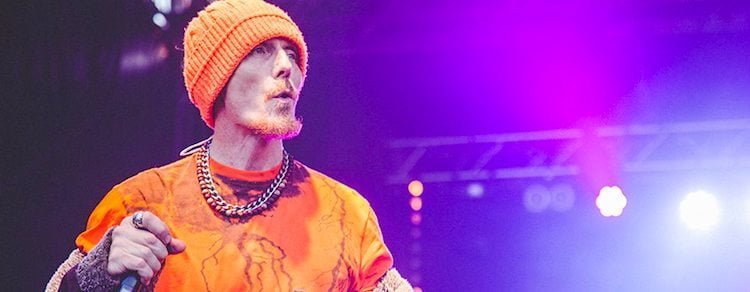

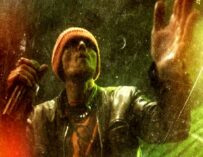
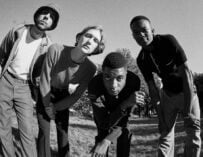
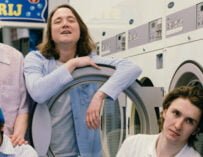

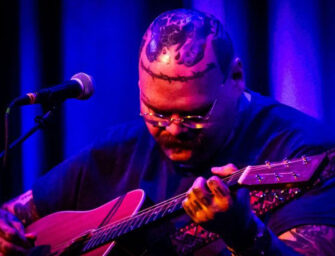
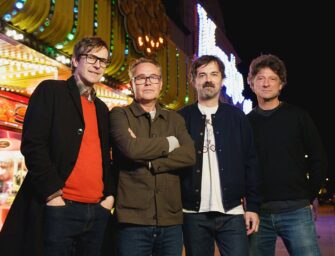

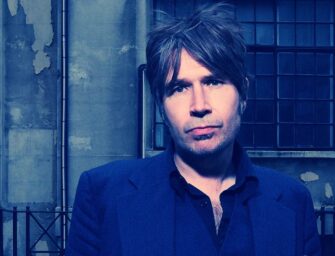























When will you be at the Sandia Pavilion Casino in Albuquerque New Mexico USA? Give me heads up so I can get front row seats! ! ! thanks can’t wait til then.